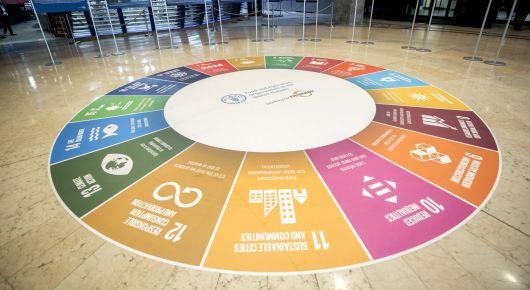Europe, Central Asia take steps towards sustainable food and agriculture

FAO technical consultation meetings in Budapest provide support for countries’ realization of the Sustainable Development Goals
3 September 2019, Budapest, Hungary – Four years have passed since the signing of the 2030 Agenda for Sustainable Development, and 11 years remain to realize the common blueprint for peace and prosperity for all people and the planet. The 2030 Agenda’s 17 Sustainable Development Goals (SDGs) have become established concepts, but their implementation poses challenges to countries and institutions alike.
To that end, FAO has organized a two-day meeting, starting today in Budapest, to enhance knowledge and the exchange of experience on the sustainable development process and to assist in its execution. For two days, selected FAO experts, government representatives and non-governmental actors will work together for this purpose.
Specifically, the goal of these two days of meetings is to help strengthen the implementation of the Sustainable Development Goals at country level through the FAO guidelines Transforming food and agriculture to achieve the SDGs. The meetings also aim to identify priorities that can help Member Countries advance their implementations of the SDGs and map the support needed from FAO. FAO has been looking into ways to promote cross-sectoral collaboration and the sharing of knowledge and experience for nationalizing SDGs and assessing policy measures required for addressing certain targets.
So far, FAO has supported the countries of Europe and Central Asia in becoming more sustainable through roughly 130 projects, in addition to national and regional workshops to raise SDG awareness. FAO participation in joint United Nations processes has further accelerated SDG achievement at country level. FAO is the custodian United Nations agency for 21 Sustainable Development Goal indicators – across six of the SDGs – and is a contributing agency for a further five.
“To achieve our ambitious targets by 2030, we have to restructure current modalities of work and strengthen multi-stakeholder and inter-ministerial dialogue,” said Vladimir Rakhmanin, FAO Assistant Director-General and Regional Representative. “The complexity of the goals requires coherent policy processes and enhanced institutional coordination. Sustainability has to be a standard feature in all our operations, not something extra.”
The realization of the 17 SDGs is a global endeavor led by countries. As a whole, the Europe and Central Asia region is leading the way on – among other issues – undernourishment, with a prevalence lower than the other four FAO world regions. Still, there are areas that need improvement, such as malnutrition and micronutrient deficiencies, rural poverty, land ownership issues, climate change, land degradation, gender equality, and access to social services. More investment would be needed to achieve measurable results at local level.
This week’s meetings in Budapest aim to help country representatives find the right and most effective paths to reach a more sustainable and equitable future. The meeting was preceded by an internal knowledge-sharing meeting in Budapest on Monday.
3 September 2019, Budapest, Hungary
